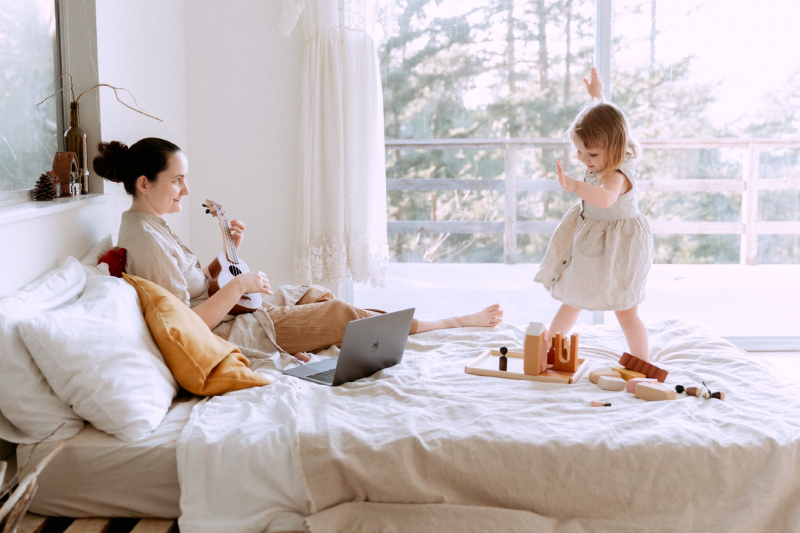6 pandemic parenting lessons we've learnt

Picking parenting battles is always challenging, and the restrictions and realities that came with the pandemic have certainly not made parenting any easier.
But there is always a silver lining if you look for it, and the pandemic has taught us several things that we as parents might not have seen otherwise, had it not been for these past two unique years.
Here are the six lessons we've learnt so far:
Easier said than done for sure. Accepting that most of what life throws at us is beyond our control, we've learnt that focusing our energy and emotions on other things is better.
Resisting or refusing to accept the situation only leads to more suffering, so the faster you accept the current situation and adapt to it, the better it is for everyone.
Give yourself the space and permission to feel the ever-changing waves of emotion, and be kind to yourself, because if you fight your feelings, they build up anyway and often get expressed in unhealthy ways.
Allow yourself to feel what you are feeling and you might just move through challenges faster and with greater ease.

Change is the only constant in life. Think about it, just when you get the family settled into a routine, something changes. Allowing yourself more flexibility and being able to quickly adapt to fast changing situations are vital parenting skills.
Emotions are contagious, and children will always remember the energy of the house, rather than what was said. Whether it feels cosy and loved, or frustrated and harried, home usually mirrors exactly what you are feeling.
Routine and structure are important for children, but the pandemic has taught us that right now we all need a little extra comfort and flexibility, grabbing opportunities to make children happy and make moments special.
That could be something as small as staying up a little later on a school night to watch a family movie together, or playing an extra video game together, or ordering in instead of cooking.
2021 might well have been the year where we learnt to prioritise fun, and only you can decide what works best for you and your family.

As adults, we took gyms and fitness classes for granted. But with the restrictions on indoor exercise facilities and being cooped up together with HBL and WFH, it was the perfect catalyst to get healthy together as a family.
Going for nature walks together in the park has been one of the most valuable silver linings we've had thanks to the pandemic, with many families making a significant lifestyle commitment to exercise and stay healthier together going forward.
Children are smarter than we give them credit for and with so many avenues open to them for information, there was really no hiding the truth from them as they watched the pandemic unfold themselves too.
Instead of trying to shield them from reality (and indeed from our own inner messes and less-than-perfect parenting personas), speaking openly with children and involving them in family discussions is very healthy.
As parents are more honest about their own feelings regarding the pandemic (be it fear, frustration or loneliness), it helps children normalise their own emotions too, giving everyone a safe avenue to vent and talk honestly and openly about what they are feeling.

If it hadn't been for the pandemic, we probably wouldn't have learnt the values of small things such as having empty schedules, eating together as a family, having ample time for intentional conversations with our kids, focusing on gratitude and what's going right, and finding creative ways to spend quality time together.
When was the last time you managed cooking and eating a healthy meal together, or read to your child in peace without mentally thinking about jumping on a call or sending one more email?
A full life doesn't require a full calendar, and it really is about the small things in life.
Even when things eventually go back to being 'normal' and life gets busier again, hopefully we'll still remember the value of balancing commitments with quality family time.
Mental health has affected everyone in some way, no matter how old you are. Children have had to stop being children and live without playing or having much interpersonal contact with other kids, while adults had to juggle work, home and children all together by themselves, without much external help.
[[nid:558405]]
We tell our children to always try their best, and that's a lesson that we should practice ourselves too as parents.
Do the best you can with what you have, because perfect parenting doesn't exist, so being kind to yourself during these stressful times is an absolute must.
Nothing protects a child's mental health more than having a warm and loving relationship with adults, especially when you're all having fun together.
Likewise, adjusting to HBL has been a big change for most children, so encouraging holistic health and overall development, rather than focusing on just grades, contributes to positive self-esteem and overall well-being for the whole family, making it a big positive for mental health too.
This article was first published in Wonderwall.sg.